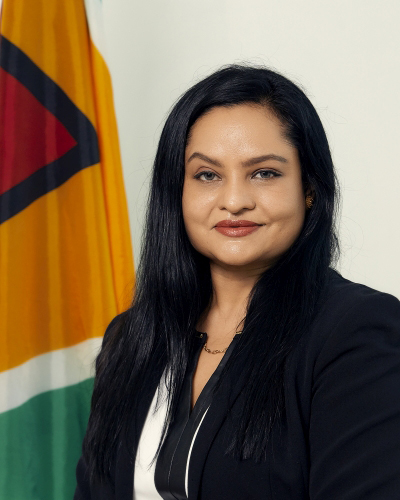Sexual and gender-based violence and domestic violence against women and girls continue to be a major challenge for CARICOM Member States.
This is according to Minister of Human Services and Social Security, Dr Vindhya Persaud who was speaking on behalf of CARICOM at the 65th Session of the Conference on the Status of Women on Tuesday.
She added “Our Governments are consistently working to eliminate such violence, ensure access to justice for victims and support for survivors. Among initiatives is improved data collection aimed at better understanding and addressing the underlying causes of violence. We continue to seek support from our developmental partners for building our capacity to collect credible data and information based on which evidence-based policies and action plans can be developed.”
The minister outlined some of the evidenced-based policies undertaken to address gender based violence and domestic violence against women by the Government of Guyana. These are: a multi-sectoral approach including prevention and intervention strategies, data collection and analysis to allow for evidence-based policy decisions and an aggressive reporting campaign engendered by a toll-free 24-hour hotline that enables victims of violence, abuse and trafficking to access immediate help and support services. The minister said that these initiatives are complemented by an app that links victims of violence to help services, vocational training opportunities and resources to move them from dependence to independence.
She stated “We are now in the decade of action to deliver the sustainable development goals and it is imperative that introspection is followed by action. It is a travesty that 25 years after Beijing, no country has achieved gender parity.” (The minister was referring to the Beijing Declaration and Platform for Action). The minister did note that women are playing essential roles in the socio-economic and political development of the CARICOM region and are found in leadership positions in every sphere of influence including politics, public services, and business and in civil society.
While women in the region occupy more ministerial posts today, they are still very much outnumbered by men. On average, less than 30% of ministerial portfolios are held by women.
Among the primary barriers, the minister listed, to women’s participation in public and political life are gender stereotypes and cultural and negative social norms. Persaud noted, “There must be an enabling environment for women to achieve full and effective participation and decision-making in public life, with men as equal partners. In this regard, we emphasize the importance of the family and the need for there to be shared responsibilities and a home environment that gives equal opportunities to boys and girls and that is free from violence. Childcare, education, health care, and robust social protection services are essential parts of this equation.”
The minister also recognized that while women in the region are more likely than men to have tertiary education, this does not always translate into higher earnings. A recent study, according to the minister, suggested that women needed to have higher educational levels if they want earnings at the same level as men. Despite higher access to, and performance in, secondary and tertiary education, they (women) tend to have lower level and lower paying jobs and dedicate three times more time to unpaid work than men. In all countries of the region, Persaud said, the employment rate is lower for women, though, it should be noted that recent statistics show that women are more likely than men to be employed by government.
Regarding the novel COVID-19 pandemic, Persaud stated that its impact has deepened gender inequalities and increased poverty. Women are disproportionately affected by unemployment and COVID-related restrictions have dramatically increased the unpaid care and domestic burdens of women and girls, which according to the minister, is reflective of an entrenched gender division of labour. Violence against women and girls has also escalated and schooling disrupted. Women and girls living in poverty and in rural and indigenous communities are increasingly at particular risk of being left behind. In addition to COVID-19, the continuing impacts of climate change provide serious challenges and setbacks for the region with women and girls being among the most affected populations.
CARICOM, said the minister, recognizes the importance of engaging men and boys in efforts to eliminate all forms of violence against women and girls. “We firmly believe that a multifaceted approach that includes measures such as encouraging the equal sharing of responsibilities in areas such as parenting and household work, public awareness campaigns, and the engagement of community leaders to address discriminatory social norms and gender stereotypes as well as a robust legislative regime can bring about significant change,” said Persaud. “Women’s very survival and their entry into leadership and decision-making are hinged on unencumbered access to opportunities for training, resources, sustainable and viable income alternatives and significant, visible national and global platforms,” the minister added.
The theme of this year’s UN Session of the Commission on the Status of Women is “Women’s full and effective participation and decision-making in public life, as well as the elimination of violence.”






